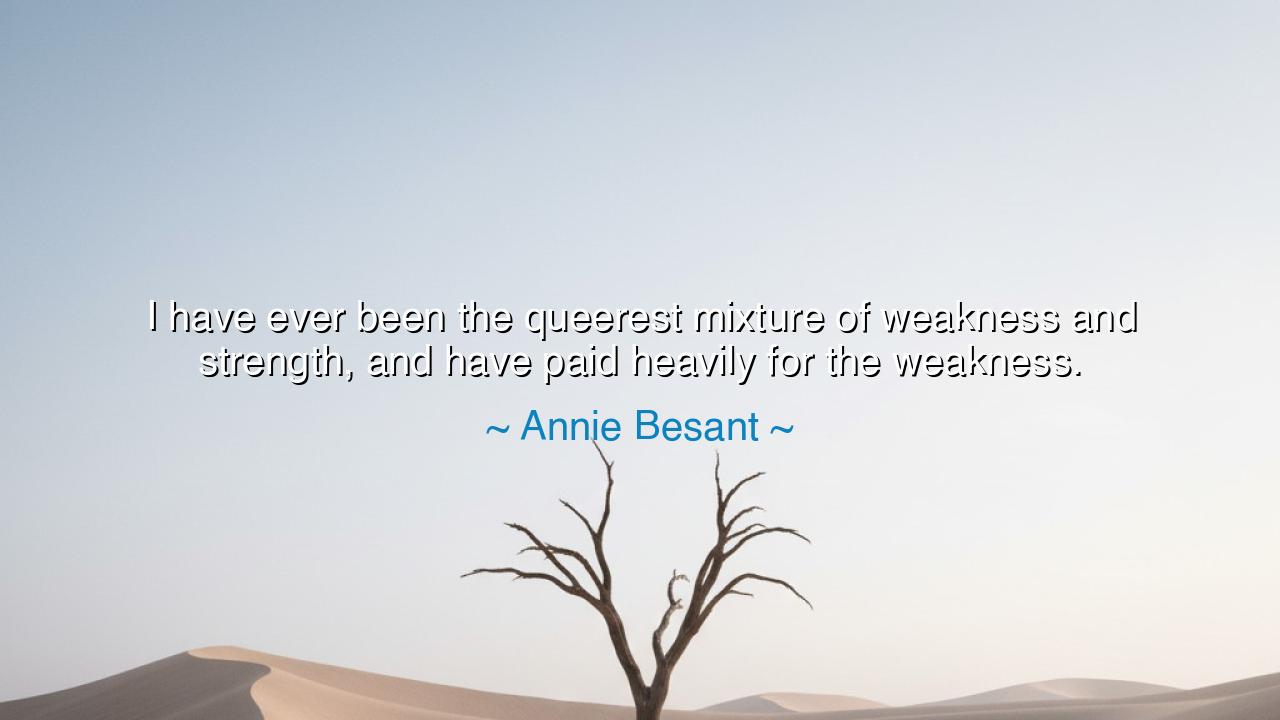
I have ever been the queerest mixture of weakness and strength
I have ever been the queerest mixture of weakness and strength, and have paid heavily for the weakness.






Annie Besant, the fiery reformer and seeker of truth, confessed with piercing honesty: “I have ever been the queerest mixture of weakness and strength, and have paid heavily for the weakness.” These words are not the lament of defeat, but the testament of a soul who walked boldly into the storms of life, knowing full well that greatness is not the absence of fault, but the ceaseless struggle between our weakness and our strength. In her confession, she mirrors the condition of all humankind: that within us dwell both the soaring eagle and the stumbling child, and our destiny is shaped by how we wrestle with the two.
The origin of this quote lies in Besant’s own turbulent life. She was a woman who dared to challenge the iron walls of tradition, religion, and empire. She fought for the poor, for women, for the oppressed; she stood at the front of social and spiritual revolutions. That was her strength. Yet she also admitted to passions, impulses, and errors of judgment that exacted from her a terrible price. That was her weakness. Her greatness lay not in pretending to be flawless, but in acknowledging the cost of her failings, while never ceasing to rise again.
This paradox of human nature has echoed across ages. Consider Napoleon Bonaparte, who possessed the strength of vision, genius, and will, yet was also undone by the weakness of pride and overreach. His brilliance lifted him to the throne of Europe; his flaws cast him into exile. Or think of Samson, the mighty judge of Israel, whose divine strength tore lions and toppled temples, but whose weakness of desire brought him low. These lives remind us, as Besant herself declares, that strength and weakness are inseparable companions in the human heart.
Yet there is wisdom in recognizing this mixture. To deny our weakness is to walk blindly toward ruin; to despise our strength is to betray our potential. The noble path is to live with both in awareness—to guard ourselves where we falter, and to build upon where we are strong. Besant “paid heavily” for her weaknesses, but through the fire of that payment, her spirit was tempered and her vision widened. Even our failures, when embraced with honesty, can be teachers that carve humility and wisdom into the soul.
We must learn, then, to forgive ourselves for being a mixture. The oak stands firm, yet it bends before the storm. The river carves valleys with persistence, yet floods with destructive force. So too are we: beings of contradiction, fragile yet resilient, broken yet unyielding. To accept this is not to excuse error, but to recognize that growth is born from struggle, and that the price we pay for our weakness can become the very soil in which our future strength grows.
The lesson for us is clear. Do not despise yourself for your flaws, nor exalt yourself blindly for your strengths. Instead, live watchfully. Where you are strong, act with courage; where you are weak, guard yourself with humility and discipline. Seek companions who balance your mixture, whose strength shields your frailty, and whose gentleness tempers your might. Above all, learn as Besant did: even when weakness costs you dearly, rise again with renewed strength, for that is the essence of the human spirit.
Therefore, let us take Besant’s words as both warning and encouragement. We are all “the queerest mixture,” yet within that paradox lies our path to greatness. Let your strength be your torch, your weakness your teacher, and your life a testimony of rising again and again from the price you have paid. In this way, you will walk not as one ashamed of imperfection, but as one who transforms even failure into wisdom, and who leaves behind a legacy both humble and unbreakable.






AAdministratorAdministrator
Welcome, honored guests. Please leave a comment, we will respond soon